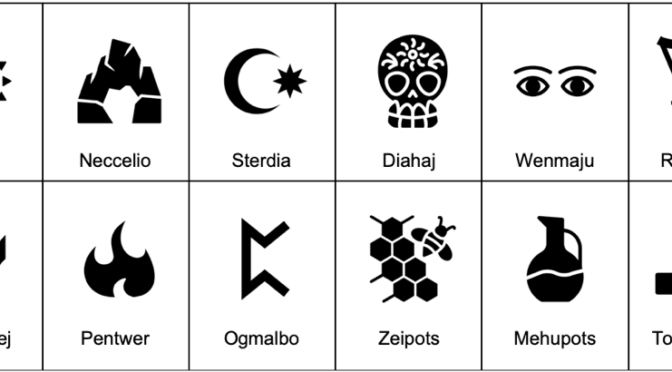The general advice for DMs building their own campaign worlds is to recognize that most of world creation won’t end up being experienced by the players. While you can go full Tolkien if you wish (to obey your own muse), you’re typically better off creating simple systems and then using fractal design to zoom in on those parts that players show an interest in.
For my Hexedland campaign, rather than write The Silmarillion, I developed a one-page pantheon, where the description of each god shared the major myth associated with that god. Read together, this provides a summary of the mythos. What follows is what I provided players at Session Zero:
Humans believe in all 12 gods, but most have two gods they consider patrons. They wear an upper arm ring with a symbol of their favored god and a finger ring with the symbol of their second god. They do not need to pick a god that exactly matches their alignment.
Common beliefs no matter which gods a player favors:
- Gods are not omniscient. They rely on prayers to learn what is happening in the world.
- Gods are not omnipotent either. They channel their actions through clerics and believers.
- Some people became gods, either through Diahaj granting them apotheosis or through them recruiting enough worshipers to achieve it on their own (Tolcu-Tolcu).
- Where a spell on a scroll can only be read by magic users, a spell on a prayer leaf can be read by anyone. A prayer leaf is a piece of parchment folded in half and then folded in thirds and placed in a small leather pouch.
- Each god has an associated taboo, an activity a character must avoid. For instance, followers of Wenmaju avoid dry food (rations), while followers of Pentwer won’t set traps or associate with someone who sets traps. Violating a taboo will suspend a player’s ability to use any prayer leaves until a tithe has been paid to the right temple in Auspele.
- The twelve gods often contest one another in mortal affairs. Other, more idiosyncratic gods are worshipped elsewhere.
| d12 | Deity / Algnmnt. | Archetype / Taboo | Symbol | Background |
| 1 | Ausdia LG | Creator / public eating | Sunburst with 12 rays | She created the sun, the trinity, and peopled the world with immortal plants and walking trees. No one ate anyone else. |
| 2 | Neccelio CE | Lawbreaker / jokes | Cave entrance | The god of the trinity, he rebelled and created animals and night and death. Sometimes called “The Devourer.” |
| 3 | Sterdia LG | Caregiver / selfishness | Crescent moon & star | The goddess of the trinity, after the first nightfall, she grew the moon and the stars. |
| 4 | Diahaj CG | Magician / routine | Painted skull | The other-gendered god of the trinity, they transformed substances, resurrected the dead, and deified mortals. |
| 5 | Wenmaju N | Lover / dry foods | Two eyes | A sublimely beautiful intersex human, they were wooed by each of the trinity. |
| 6 | Regwena NG | Hero / torture | Bow with arrow | Originally a princess, she singlehandedly defended her brothers from an orc attack and then found and freed her kidnapped husband. Mother of Coronosej. |
| 7 | Coronosej LN | Ruler / frivolity | Crown | She created an alliance of races, defeated an invasion of monsters, and became the first empress of Cedreg. |
| 8 | Pentwer NE | Explorer / setting traps | Flames | A dwarf, he went into the wilderness and blazed a trail for settlers. (Caring little for who already lived in the wild.) |
| 9 | Ogmalbo LE | Sage / deception | E-shaped rune | An elf, she compiled lore on the lands opened up by Pentwer. |
| 10 | Zeipots LG | Everyman / luxury goods | Bumblebee | Originally a human farmer, he was the first to tame bees and cultivate honey. |
| 11 | Mehupots CN | Jester / books & scrolls | Ancient vase | A halfling bard, she stole honey and invented mead. |
| 12 | Tolcu-tolcu CG | Innocent / bigotry | City on a hill | She taught cosmopolitanism and radical inclusiveness to the citizens of the empire, became widely worshipped and achieved apotheosis on her own. |
Iconography
The archetypes for the gods came from The Hero and the Outlaw. The icons were all sourced from The Noun Project (for which I have an annual license).

Update: For a generic list of gods, see Reskinnable Pantheon for a Module.


You must be logged in to post a comment.